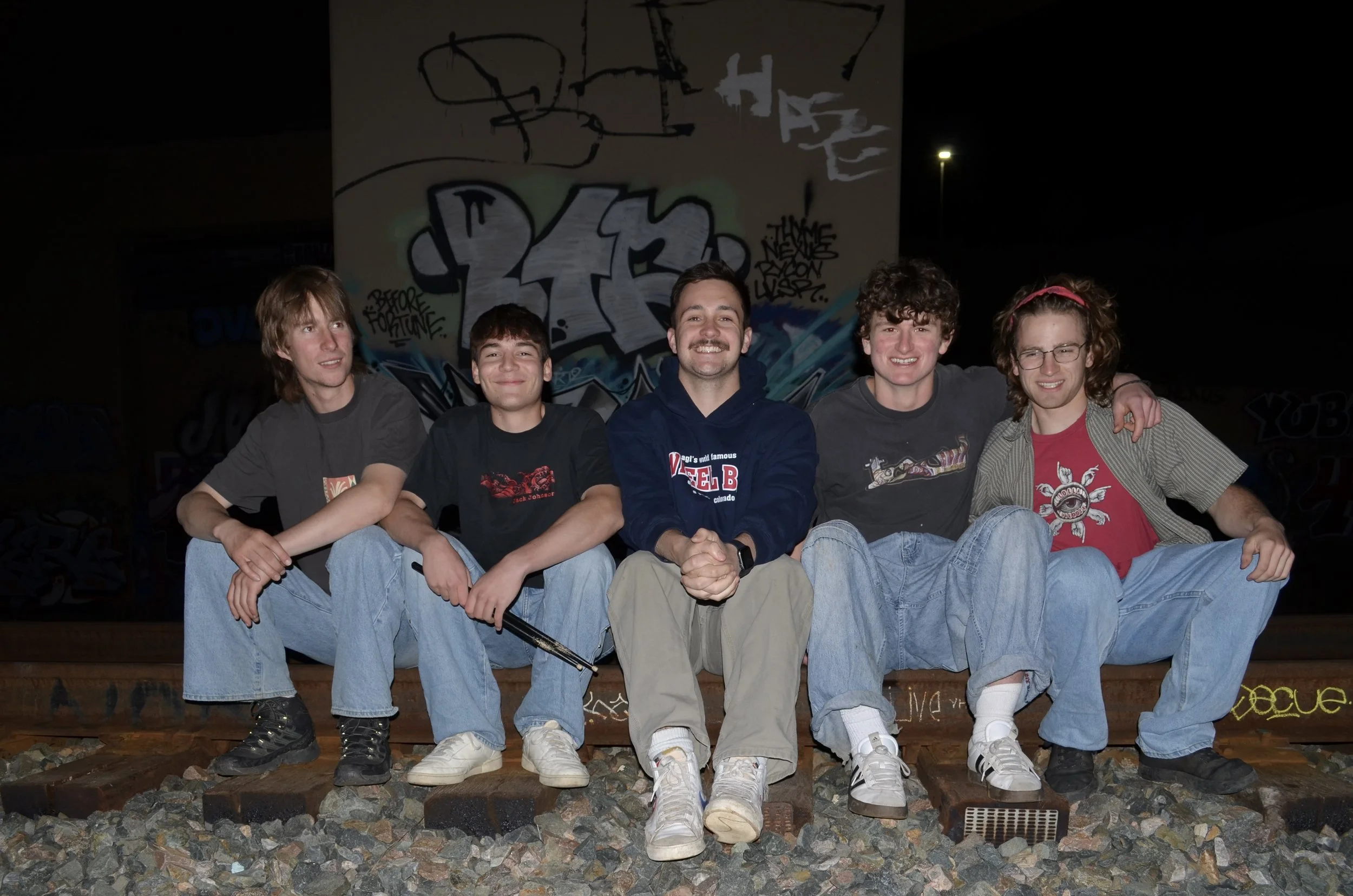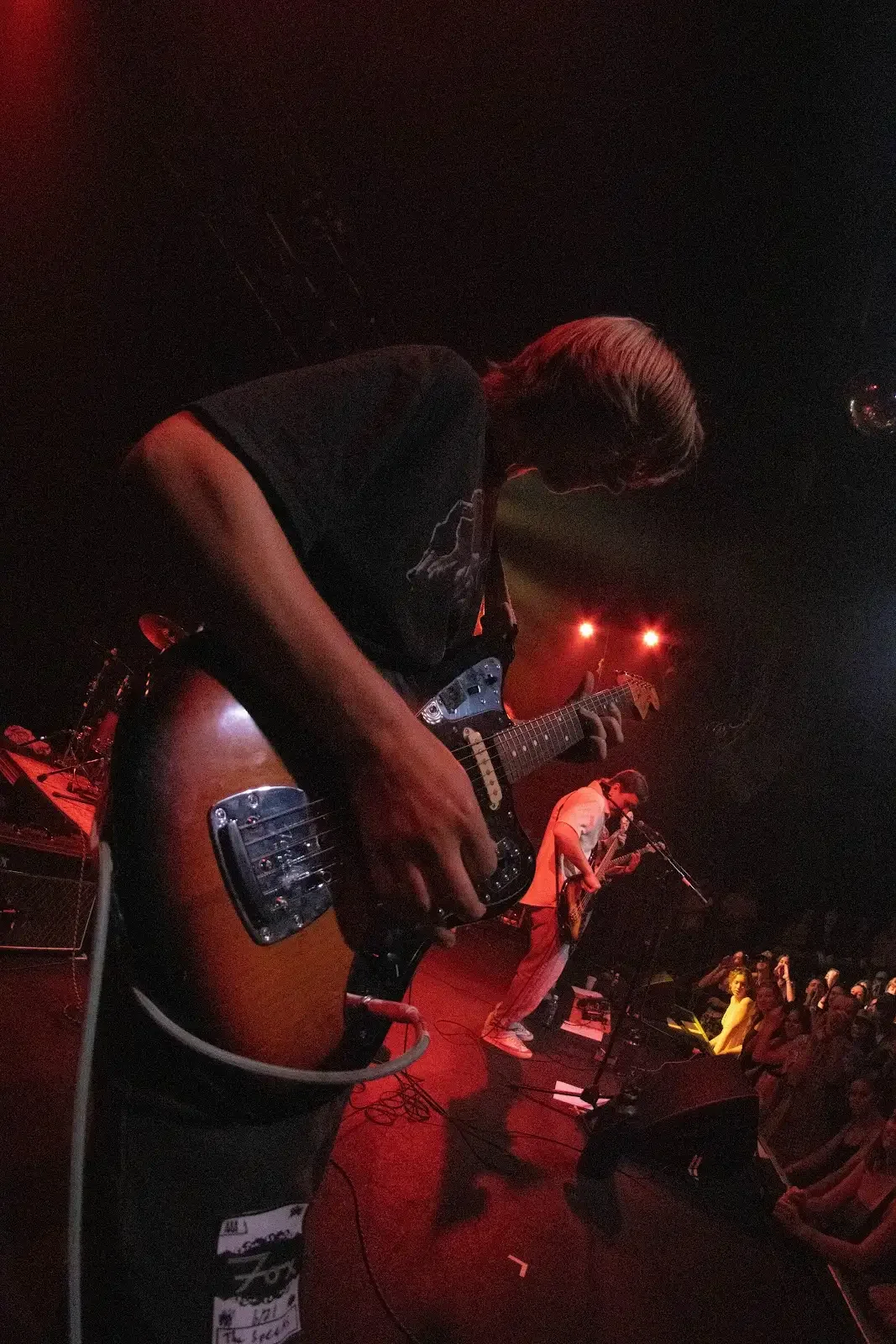Ahead of the Noise: The Speeks and Boulder’s Crowded New Era
The Speeks embody versatility in every aspect of their music. From songwriting to composition, this five-piece Boulder band effortlessly blends their individual styles into a sound that defies categorization. Their discography spans from raw indie-rock, seen in their first demo Poltergeist, to smooth jazz-rock, seen in their latest single Keep Talking. What began as unpaid gigs in fraternity backyards has evolved into headlining performances at Boulder’s renowned Fox Theatre, a testament to their growth, grit, and authentic chemistry.
Guided by their manager, Mary-Scott Black, The Speeks have cultivated a loyal hometown following, packing venues across the city with their unmatched sound and stage presence. The Speeks (Micah Zogaric, Spencer (Spong) Rask, Cooper Elliot, and brothers Zach and Calvin Vozoff) are now setting their sights on their next big step: hitting the studio to record their debut album, set to release around May 2026. With genre-blending tracks that push creative boundaries, this is one drop you won’t want to miss.
Stay up to date with The Speeks’ journey on Instagram @The_Speeks and stream their latest single Keep Talking now.
I sat down with the band to talk about their roots in the Boulder music scene, the influences behind their multifaceted sound, and what’s next for one of Boulder’s most promising up-and-coming acts.
Where did the name The Speeks come from, and how did you all meet?
“From the very beginning, when someone asks, we tell people it’s a secret. We will say that its an amalgamation of two words. However, it’s kind of taken on a new meaning with the Keep Talking single cover with the telephone booth because the guy’s speaking. It’s whatever you want it to mean, but we decisively can’t tell you. There is a specific meaning that’s derived from two words and it’s a versatile name. So, we all met in high school, except Micah, and we formed this band that played covers at grad parties. After that, we met Micah in the dorms at CU Boulder, and I remember jamming one night, playing Tequila in the basement. We planned on jamming together in our (Calvin and Zach) parent’s house, but our original bass playing pulled out from practicing that day, so we called Cooper. That was the completion of The Speeks.”
How would you describe your collective sound?
“This is actually something we’ve been grappling with thinking about our upcoming album. We don’t really have a set sound, it’s a lot of varying genres. We have a general sound, but not everything is going to sound the same. The album we’re going to be putting out will showcase that general sound, and you’ll be able to tell that it’s a Speeks song, but the records will cross multiple genres and take influence from a lot of different places since our backgrounds are all diverse as musicians. We have music ranging from heavy rock, folk, and blues. Every new song we work on, we try to make them as unique as possible and different from our previous songs. We don’t want people to listen to the entire album and feel sick by the end of it because everything sounds the same. We try to really innovate each song and try something as new and out-there as possible. It’s easier to get stuck into one sound than it is to have too much diversity. We’re a very versatile band, but it's better to have too much diversity than none at all.”
What does the songwriting process look like for you guys, and what are the main differences between your demo, Poltergeist, and your newest single, Keep Talking?
“Zach writes most of our lyrics and melody because he’s the singer. He’ll bring those ideas to the rest of the band and we figure it out from there. It’s pretty collaborative after that. For our single, Keep Talking, we were sitting in the basement just riffing off of each other and improvising. The lyrics “keep talking” were originally used as filler, but we ended up just forming a meaning for the song around that. It’s not a very deep song, it’s just about being drunk at a party and you want somebody to stick around and keep talking to you. I wouldn’t say it’s a stupid song though, it’s just a bit more surface level than most of the songs we write. What’s cool is that we all have very different music tastes, so when we're writing songs we all bring something different to the table. There’s not a whole lot of interference. That song was actually brought to you by the rhythm section, which is rare. If you think deeper about Keep Talking, it’s more about being surrounded by people in a big social setting, yet you still have this feeling of being alone. It’s about wanting somebody to distract you to take your mind off of whatever it is you're thinking about. On a deeper level, it’s about a feeling of insufficiency and almost desperation, like, ‘Don’t leave, stay here, keep talking’. It’s not a breakup song, it’s more about the effort that goes into maintaining a conversation and feeling like you may be slipping. One of the lines in Keep Talking is, ‘I know you get me so down, but right now some conversation’s all I need.’ So, it’s kind of saying, I don’t really care who you are, I just want somebody to talk to. Poltergeist was written amidst a lot of life changes. We were leaving high school, and just becoming adults. It’s about nostalgia, having to leave certain things behind, and how to deal with all that mentally. The poltergeist is essentially this entity haunting you through all those changes. If you dwell on your ways of bandaging stuff up instead of dealing with it, it tends to corrupt the good memories. Regarding the differences, we were going for a different sound with Keep Talking. Poltergeist is an indie rock song, inspired by artists like Peach Pit, The Backseat Lovers, and Hozier. Keep Talking is more of a pop jazz vibe. We wanted to make a danceable song, and that’s why the lyrics are a bit more mundane because it makes the song easy to sing along with since there aren’t many lyrics. It’s a very rhythm heavy song because there’s a lot of instrumental stuff that you can dance to.”
How does being part of the Boulder indie scene influence creative drive, does it feel more competitive or collaborative?
“The scene is in kind of a revival era at the moment. A few years ago there weren’t many bands at all, so we kind of rose up as a band in the same wave as other bands like Huck N’ Pray. The Galentines, The Dirty Turkeys, and The High Lines paved the way, we sort of rose in the wake of those bands. We were the early adopters if you will. There used to be only three or four bands on campus, now there’s like three dozen. We’re pretty unique within the scene though because more than half of the bands right now are jam bands. We really focus on our songwriting and rehearse every part of our songs. To go back to your question though, I think it’s very collaborative, there are just so many bands in the scene right now that it takes a lot of effort to make yourself known. It was a long process before we were ever regarded as anything more than an indie cover band. We didn’t play a single paid gig until last summer at the Fix Theatre. We spent a whole year playing coffee shops, house shows, and frats- usually paid in beer. Now, since we’ve set our feet and are more known around the Boulder scene, it’s become a lot more collaborative because we’re in the same sphere as other bands. However, there are a lot of people who are still trying to start bands, and I think if you’re in that stage right now, it’s definitely going to be more competitive because you’re just looking for any gigs you can play. Even for us, it felt like we had to compete a lot last year, and there wasn’t nearly as much saturation as there is now. We kind of got lucky with the timing because the scene was more collaborative and desaturated. We’re optimistic about the future of music coming out of CU because everyone in the scene is awesome, we love playing with bands like Huck N’ Pray and Squash.”




